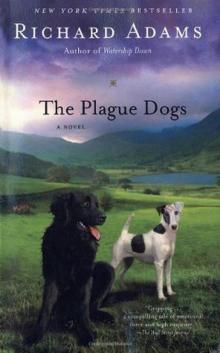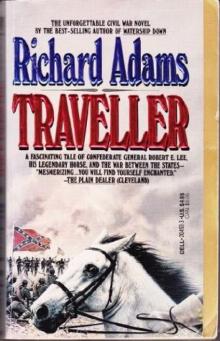- Home
- Richard Adams
The Plague Dogs: A Novel Page 46
The Plague Dogs: A Novel Read online
Page 46
“No men up there, Snitter! Come on!”
Running again, wet sand cold between the claws, dry sand blowing into eyes and nostrils, sound of breaking waves beyond the hillocks; raucous cries of gulls.
“Rowf! Look!”
Rowf stopped dead in his tracks, hackles rising.
“It’s the sea, Rowf—the sea the tod told me about that day, after I’d come out of my head! I remember what he said. He said, ‘Salt and weeds. It’s all water there.’ I didn’t understand how a place could be all water. Look—it’s moving all the time.”
“It’s not alive, though. It’s another of those damned tanks. They’ve turned the whole world out there into a tank! I wouldn’t have believed it.”
“The sand’s nice and warm, all the same,” said Snitter, lying down at the foot of a dune. “No men. Out of the wind.”
He curled himself up as the song of the waves stole gently along the shore and through the whorls of his broken skull.
“You have licked clean the bitter bowl
And now need wander on no more.
The charm’s wound up and closed the scroll,
For you have reached the furthest shore.
Lie down and rest, poor dog, before
Your great sea-change cerulean,
And sleeping, dream that we restore
The lost dog to the vanished man”
“I wish—I wish I could see my master just once again,” murmured Snitter. “We were always so happy. That poor terrier—I’d have tried to help her if I hadn’t been so frightened. I wonder what’ll happen to them all now—the terrier and the lorry—the mouse and all the rest of them? I’m afraid they won’t be able to manage without me. They’ll disappear, I suppose. But I must go to sleep now—I’m so tired. Good old Rowf—I must try to remember—remember what the tod said—”
Rowf, too, had lain down in the sand and was sleeping as a dog sleeps who has wandered for two nights and a day. The tide was still ebbing and the sound of the waves receding, gentler and softer.
The helicopter remained where it was, poised above Ravenglass, for the dogs were in full view through binoculars and there was nothing to be gained by disturbing them as the soldiers drove up, got out of their buses and fell in outside the Pennington Arms.
Major Awdry, having located the dogs, was half of a mind simply to take a rifle and cross the estuary by himself. On second thoughts, however, it seemed best to send a platoon across in extended order, for the dogs had already shown themselves remarkably resourceful and even now might try to escape northward towards Drigg. No. 7 platoon, swearing at the prospect of more wet feet and wet boots, crunched down the shingle, deployed on the sands and began crossing the estuary. Awdry and the platoon commander carried loaded rifles.
It was too early for visitors at the hospital and Digby Driver, in the hall, was referred to a notice confirming the hours; however, as the reader will have no difficulty in believing, he knew a trick worth two of that. He spoke forcefully of urgent and pressing business, flashed his press card and offered, if desired, to bring Sir Ivor Stone in person to the telephone. The West Indian sister, an Orator reader, knew his name and found his cheek rather attractive. The hospital were not altogether unused to bending the rules for visitors on a Saturday and anyway the nurses felt sorry for the nice, gentlemanly Mr. Wood, who had suffered such dreadful injuries and had so few visitors. He was, Digby Driver learned, at present convalescent in a small post-operational ward of only two beds. The other bed was empty at the moment, the patient having been discharged on Friday. Putting out his cigarette and following the directions he had been given, Mr. Driver walked, breathing the familiar hospital smell, along numerous corridors, went up in a lift, and upon getting out found himself opposite the right door.
Mr. Wood, who had ceased to expect any reply to his letter, was surprised and gratified to find Digby Driver at his bedside. He looked wretchedly ill and explained that he still had a good deal of pain in his left leg, which had been broken in two places.
“It’ll never be as good as it was, I’m told,” he said. “Still, I shall be able to walk again—after a fashion—and drive a car; and I’ll be able to get back to work, of course, which’ll be everything. But Mr. Driver, kind of you as it is to come here, I’m sure you didn’t make the journey simply to hear about my health. Can you tell me about the dog in the photograph? Is it my dog?”
“You tell me,” answered Driver. “There are the originals.” And he laid them on the sheet before Mr. Wood’s eyes.
“Why, that is Snitter!” cried Mr. Wood. “There’s not a doubt of it!” He looked up with his eyes full of tears. “Good God, what have they done to him? However could he have fallen into their hands? I can’t bear to look at it. Mr. Driver, please tell me at once—where is the dog? Have they killed him or what?”
“Look,” said Driver, “I’m terribly sorry, but I’m afraid the truth is that they may have. The two dogs were seen in Eskdale late last night and soldiers are searching the valley for them at this moment, with orders to shoot on sight. They certainly wouldn’t listen to anything I could say, but if they’ll let you out of here, I’ll drive you up to Eskdale myself and give you all the help I can.”
“Well, they can’t legally stop me discharging myself. You’re most kind. But, it’s going to be a hell of a business. I can only walk with someone else’s help. I can stand the pain, but I get very tired.”
“I’m someone else, Mr. Wood.”
“You really think there might be a chance of saving Snitter?”
“I think there’s a sporting chance that we might be able to do something, though I’m damned if I can see what, just off the cuff. And I’m afraid it’s more than likely that it may be too late. I can only repeat, I’ll help to get you out and I’ll drive you up there as fast as I can. This is one hell of a story, you see, and of course it’s the story I’m after—I’ll be frank about that. But I’m on your side, too, Mr. Wood—I genuinely am. Come on, where are your clothes—in that wardrobe? Right, here we go. Once we’re in the car I’ll tell you all about the whole thing.”
To pilot Mr. Wood out of the hospital did indeed prove a task almost beyond the power of Digby Driver his very self. Only he could have pulled it off. Heracles would have owned the Alcestis operation a right doddle in comparison. Twice he almost came to actual grips with members of the staff. Telephone calls were made to consultants, but these Digby Driver ignored. The summoned house surgeon on duty, a pleasant enough young man, he invited to send for a policeman, sue the London Orator or jump into Wastwater, as preferred. The hall porter (Africa Star with 8th Army clasp) was told that if he laid a hand on the patient or his escort the London Orator would have his guts for garters. At the door, however, all resistance suddenly evaporated and the resolute, hobbling pair, watched with uncomprehending astonishment by the early visitors, festooned with dire warnings and leaving behind hands, both black and white, emphatically washed of them on all sides, reached the green Toledo and set off for Eskdale by way of Broughton and Ulpha.
The wind, veering round into the east, carried to the sleeping Rowf’s unsleeping nostrils the smells of rifle oil, leather and web equipment. A moment more and his waking ears caught the sound of human voices. He stared in terror at the extended khaki line across the sands.
“Snitter! The red-hat men are here—they’re coming!”
“Oh, Rowf, let me go to sleep—”
“If you do, you’ll wake up on the whitecoats’ glass table! Come on, run!”
“I know they’re all after us—I know they’re going to kill us, but I can’t remember why.”
“You remember what the sheep-dog said. He said his man believed we had a plague, a sickness or something. I only wish I had—I’d try biting a few of them.”
In and out of the undulant dunes, the marram, gorse and sea holly, dead trails of bindweed and dry patches of clubrush. Down winding, sandy valleys doubling back on themselves, catching sight once more of the soldie
rs now horribly nearer; dashing through deep, yielding sand, over the top and down; and so once more to the sea-wet shore, long weeds, gleaming stones, flashes and pools; and beyond, the breaking waves.
“Snitter, I won’t go back in the tank! I won’t go back in the tank!”
Rowf ran a few yards into the waves and returned, a great, shaggy dog whining and trembling in the wind.
“What’s out there, Snitter, in the water?”
“There’s an island,” said Snitter desperately. “Didn’t you know? A wonderful island. The Star Dog runs it. They’re all dogs there. They have great, warm houses with piles of meat and bones, and they have—they have splendid cat-chasing competitions. Men aren’t allowed there unless the dogs like them and let them in.”
“I never knew. Just out there, is it, really? What’s it called?”
“Dog,” said Snitter, after a moment’s thought. “The Isle of Dog.”
“I can’t see it. More likely the Isle of Man, I should think, full of men—”
“No, it’s not, Rowf. It’s the Isle of Dog out there, honestly, only just out of sight. I tell you, we can swim there, come on—”
The soldiers appeared, topping the dunes, first one or two, here and there, then the whole line, red berets, brown clothes, pointing and calling to each other. A bullet struck the rock beside Rowf and ricocheted into the water with a whine.
Rowf turned a moment and flung up his head.
“It’s not us!” barked Rowf. “It’s not us that’s got the plague!”
He turned and dashed into the waves. Before the next shot hit the sand he was beside Snitter and swimming resolutely out to sea.
“To Ravenglass?” said Digby Driver. “Are you sure? Can they really have got there since last night? It must be all of eight miles, even in a dead straight line.”
“That’s what the paratroop officer said, sir. Seems one of the helicopters actually saw the dogs on the beach. Anyway, that’s where the soldiers went, and all the newspaper men have followed them; and the Secretary of State too, in his car. They’re all down there.”
“Good God!” said Digby Driver to Mr. Wood, who was half-lying on the back seat and biting his lip at each spurt of pain in his leg. “This seems incredible! Are you all right? D’you want to go on?”
“Yes, if that’s where Snitter is, I can make it. It’s very good of you, Mr. Driver—”
“Oh, bollocks!” said Digby Driver, letting in the clutch with a jerk that almost drew a cry from Mr. Wood. “I’m as big a darling doggies sucker as any old Kilburn landlady. On we go! We were left galloping, Jorrocks and I.”
“Joris and I.”
“Precious little the matter with you,” said Digby Driver.
“Don’t exhaust yourself, Snitter; don’t struggle so hard! Just keep afloat.”
“I can’t seem—to manage it! Why have we gone such a long way already?”
“There’s a current carrying us along the shore and away from it as well. Is it far to the island, Snitter?”
“Not very far, old Rowf.”
“Bite on to my tail if you like. I learnt a lot about staying afloat in the tank, you know.”
“Everything rocks up and down.”
“Keep it up. We must get to the Isle of Dog!”
Splashing and struggling and choking mouthfuls of salt water. Tossing up and down, spray in the eyes. Bitterly cold now, and horribly lonely and a sudden screaming of gulls, fierce and angry, but nothing to be seen.
“Rowf? There’s something terribly important I’ve got to tell you; about the tod; but I’ve hurt my head and I can’t remember it.”
“Never mind. Just stay afloat.”
“Dammit!” said Digby Driver, pulling up. “This isn’t right. I’m afraid I’ve been concentrating on driving at the expense of map-reading. This obviously can’t be the road to Ravenglass. Have you any idea where we are?”
“ ‘Fraid not,” replied Alan Wood. “I’m a bit done up. to tell you the truth—haven’t been noticing much for a bit. I’ll try and get myself together.”
“That must have been Drigg we just came through,” said Driver, looking at his map. “Yeah, and we’ve gone under the railway line, you see. I’d better turn round. Oh look, there’s a chap just got out of that Volvo up there ahead. Let’s go on up and ask him.”
Jolting and swaying, and Mr. Wood clutching his plaster-of-paris leg and just succeeding in keeping quiet, with the sweat running down his white face.
“I say, excuse me, sir, we’re looking for some soldiers—paratroopers—have you seen any? Can you tell us the way to Ravenglass?”
The burly, pleasant-looking, soldierly man in gum-boots and an anorak came up to the driving window.
“Looking for soldiers, are you? Well, as far as I can make out you’ve come to the right place—or rather, the wrong place from my point of view. Just got back here from Gosforth and find ‘em prancing all over my nature reserve, restricted areas and all. Never so much as a word of warning, let alone a request for permission to enter. And there’s a helicopter up there, terrifying every bird for miles. I’ve a damn good mind to ring up the War Office and ask them what the hell they think they’re doing.”
“I may be able to help,” said Driver. “I’m a newspaperman. That’s why I’m after the soldiers. And the soldiers are after the so-called Plague Dogs, if you know about them. D’you mind telling us where you fit in?”
“My name’s Rose—Major Rose. I’m the warden of the Drigg nature reserve. That’s all this peninsula, as far as it goes down—about two miles of dunes. Well, what the hell do the soldiers think they’re doing, can you tell me? Fortunately it’s a slack season now, very few migrants about, but dammit all, it’s bad enough. My wife’s told me she heard a couple of shots fired. I ask you! Shots!”
Mr. Wood could not suppress a cry of anguish.
As quickly as possible, Digby Driver explained the position. Major Rose listened with evident sympathy and understanding.
“Well, we might just be in time to do something yet. For one thing, no one can legally use a firearm in the nature reserve, and I don’t care who the hell they are. Come on, let’s get down there in the car—or as far as we can. I’m afraid the track doesn’t go anything like as far down as Drigg Point, but it’ll take us a good bit of the way and after that I expect we’ll be able to manage something. Can I hop in beside you, Mr, Driver? Splendid, You all right, Mr. Wood? God, you’ve got some guts! Walked out of the hospital, did you, just like that? Good for you! Sure to be a blessing on that.”
They had not gone far down the peninsula when they observed two red berets stumbling their way towards them over the undulant dunes. They could be seen pausing, looking out to sea through binoculars and pointing. Major Rose got out and went briskly to meet them, while Digby Driver helped Mr. Wood out of the car and gave him his shoulder to do the best he could to follow. It took them several minutes to reach the soldiers. When they finally did so, Major Rose seemed to have calmed down a little.
“Mr. Driver,” he said, “this is Major Awdry, who tells me he’s in charge of this dogs’ exercise, and oddly enough we’ve both been in the same regiment—before he transferred and started jumping out of aeroplanes, that is. He tells me they haven’t shot your dog, Mr. Wood, but I’m afraid it’s a bad prospect for the poor beasts, all the same.”
“What’s happened?” cried Mr. Wood. “Where are they?”
“They’re out there,” said John Awdry grimly, pointing and handing over his binoculars. “I’m afraid you can hardly see them now. The tide’s taken them out pretty far and there’s a north-setting current that’s sweeping them up the coast as well.”
“They might come ashore on Barn Scar,” said Major Rose. “That’s a sandy shoal, you know, that stretches out quite a long way about a mile and a quarter north of here. Tide’s on the turn, too. If only they can stay afloat,” he added. “Your chaps won’t be shooting any more, will they? Where are they, by the way?”
; “I left them down by the point,” replied Awdry, “while Mr. Gibbs here and I came up the shore to try and keep the dogs in sight. No one’s authorized to fire except officers, and we won’t, of course, so don’t worry about that.”
Mr. Wood, having been helped to sit down, remained staring out to sea through the binoculars without a word. There was, however, nothing now to be seen between the tossing waves and the grey, November sky.
“Can’t—any more—Rowf.”
“Bite on to me, Snitter. Bite!”
“Cold.”
“The island, Snitter—the Isle of Dog! We must get there!”
“Cold. Tired.”
No feeling in the legs. Cold. Cold. Longing to rest, longing to stop, losing two gasps in every three for a lungful of air. The stinging, muzzle-slapping water, rocking up and down. This isn’t a dream. It’s real, real. We’re going to die.
“I’m sorry—Snitter, about—about the tod. All my fault.”
“That’s it! Remember—tod—tell you—reet mazer—”
“What?”
“Reet mazer—yows—”
Cold. Sinking. Bitter, choking dark.
COLLOQUY
THE READER: But are the Plague Dogs, then, to drown
And nevermore come safe to land?
Without a fight, to be sucked down
Five fathom deep in tide-washed sand?
Brave Rowf, but give him where to stand—
He’d grapple with Leviathan!
What sort of end is this you’ve planned
For lost dogs and their vanished man?
THE AUTHOR: it’s a bad world for—well, you know.
But after all, another slave
It’s easy come and easy go.

 Watership Down
Watership Down Tales From Watership Down
Tales From Watership Down Maia
Maia The Plague Dogs
The Plague Dogs Shardik
Shardik Traveller
Traveller The Girl in a Swing
The Girl in a Swing The Day Gone By
The Day Gone By Daniel
Daniel The Plague Dogs: A Novel
The Plague Dogs: A Novel